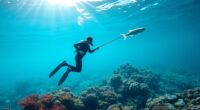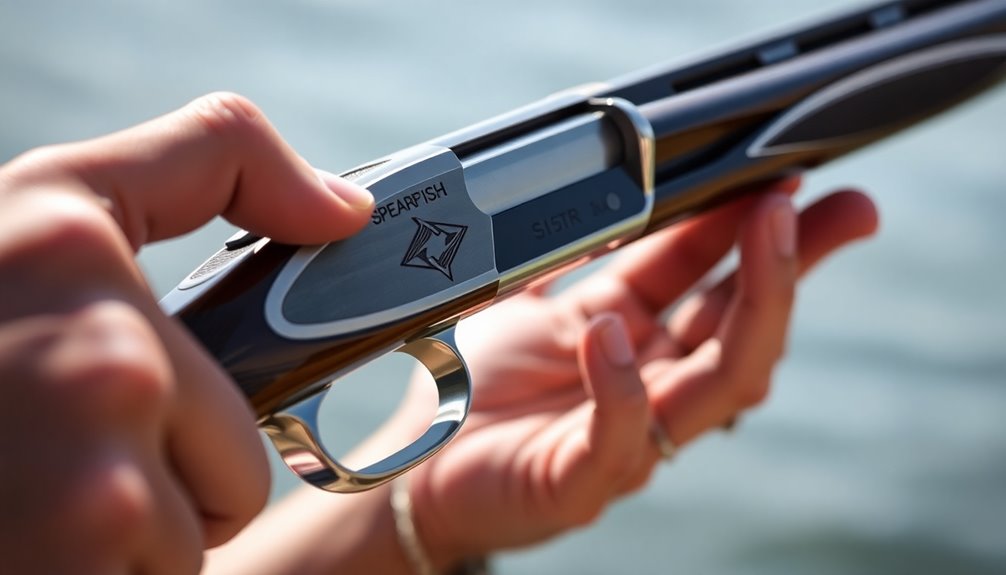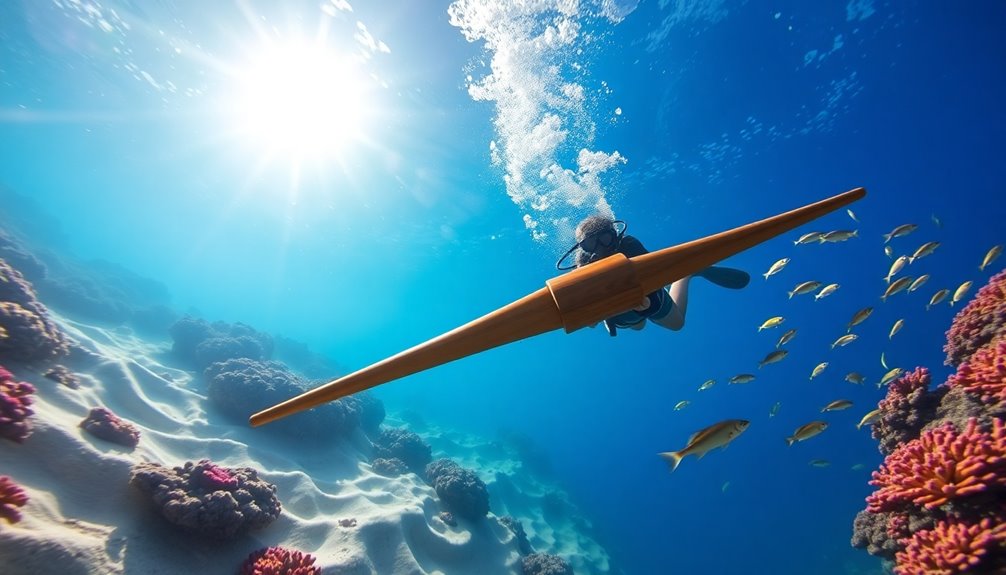Spearfishing regulations vary greatly across regions. In North America, rules depend on states like Florida and Michigan, with restrictions on species, sizes, and protected areas. Caribbean nations, South America, and Europe enforce permits, size limits, and protected zones, while Africa and Asia often have stricter bans or permit systems. Oceania emphasizes conservation with size limits and protected areas, and the Middle East varies from bans to regulated zones. Continue exploring to learn specific regulations for your next location.
Key Takeaways
- Regulations vary significantly across regions, with specific rules for licensing, gear restrictions, and protected species in each area.
- North America enforces state-specific rules, including size limits and seasonal bans, especially in marine protected zones.
- Caribbean and South American countries regulate target species and enforce protected area bans, with varying levels of enforcement.
- Europe, Africa, and Asia implement licensing, gear restrictions, and protected species regulations, often prohibiting spearfishing in marine protected areas.
- Oceania and Middle East regions emphasize sustainable practices, with restrictions on gear, seasonal limits, and prohibited zones like MPAs.
North America

Have you ever wondered how spearfishing regulations differ across North America? In the U.S., regulations vary widely by state. Some states, like Florida, require a saltwater fishing license and restrict spearfishing near public beaches and piers. Others, such as Michigan, recently legalized freshwater spearfishing for species like walleye, pike, and lake trout, with specific season and size limits. The Great Lakes region allows spearfishing for certain fish, but zones and rules are set to protect marine life. Many states enforce minimum size limits and seasonal restrictions to prevent overfishing, and some areas ban spearfishing altogether in marine protected zones. Federal waters, starting at three miles offshore on the East Coast and nine miles in the Gulf, may have different rules, but states primarily govern spearfishing activities. Additionally, understanding arcade machines and their regulations can help enthusiasts enjoy the activity responsibly and legally.
Caribbean and Central America

Are you curious about how spearfishing regulations vary across the Caribbean and Central America? In this region, many countries, like the Bahamas and Dominican Republic, require fishing licenses and regulate the species you can target. Spearfishing is generally allowed in open waters but often restricted or banned in marine protected areas and national parks to protect marine biodiversity. Countries such as Belize and Costa Rica enforce size and bag limits on fish species like grouper, snapper, and parrotfish to prevent overfishing. Some nations, including Jamaica and the Cayman Islands, prohibit spearfishing within reef sanctuaries and protected zones to safeguard coral reefs and juvenile fish populations. Enforcement varies, with some areas implementing strict patrols and penalties, while others have limited oversight. Incorporating enforcement efforts can help authorities optimize enforcement efforts and monitor illegal activities more effectively. Additionally, understanding regional regulations can assist spearfishers in complying with local laws and preserving marine ecosystems, especially as regulations evolve to address changing environmental conditions. Enhanced surveillance technology can support these efforts by providing real-time monitoring and data collection to ensure compliance.
South America
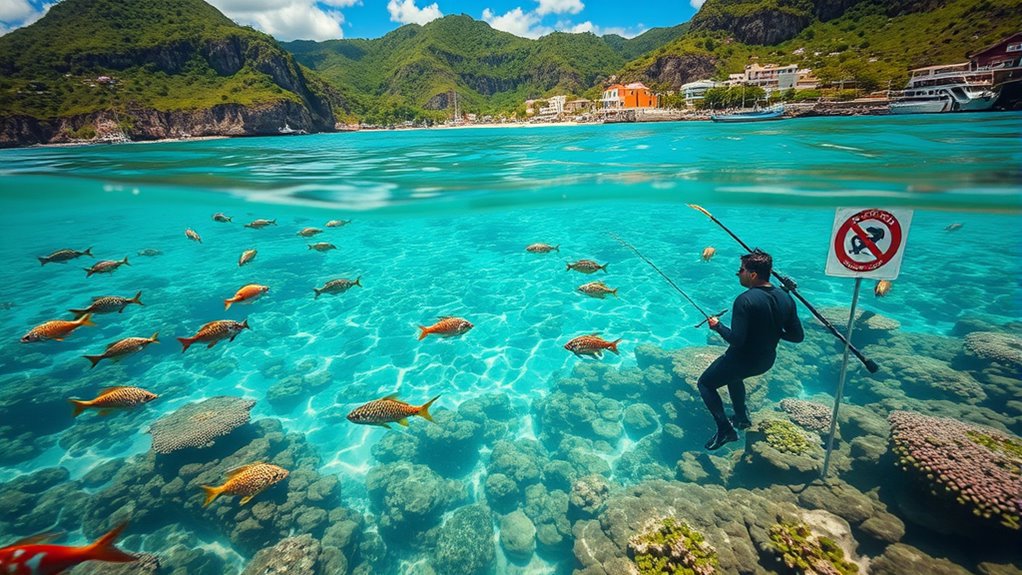
Spearfishing regulations in South America reflect the region’s diverse marine environments and conservation priorities. Many countries, like Brazil and Argentina, enforce strict local regulations to prevent overfishing and protect marine ecosystems. Brazil bans spearfishing in marine protected areas, where species restrictions are tight, especially for sea turtles, sharks, and corals. Argentina allows spearfishing with a license, implementing species restrictions on hake and southern bluefin tuna to avoid overfishing. In Peru and Chile, seasonal bans and size limits help ensure sustainable practices for species like anchovy and jack mackerel. Enforcement can be challenging, so understanding local regulations is crucial. Your responsible approach helps preserve these vibrant ecosystems while enjoying your spearfishing adventures in South America.
Europe

Did you know that spearfishing regulations across Europe can vary considerably from one country to another? Some nations, like Croatia and Greece, allow it with specific licenses, while others, such as Turkey and Egypt, impose stricter bans or restrictions. The European Union promotes sustainable fishing, enforcing regulations governing gear, size restrictions, and protected species. Many coastal countries prohibit spearfishing in marine protected areas and national parks to protect fragile habitats and species. You’ll also need to use buoy markers and visible licenses, and follow seasonal and species-specific rules to avoid overfishing. Regulations are frequently updated, so always check local laws before you dive. Staying informed guarantees you fish responsibly and avoid penalties. Understanding heat pump technology can help you choose more energy-efficient equipment to reduce environmental impact. Additionally, staying aware of the importance of sustainable practices ensures that fishing activities do not harm marine ecosystems.
Africa

In Africa, spearfishing regulations vary widely across countries, with some enforcing strict restrictions to protect marine life. You need to follow local rules, especially in protected areas or when targeting certain species, to avoid penalties. Responsible fishing practices are essential to preserving the region’s rich biodiversity and ensuring sustainable use of resources. Utilizing regulation enforcement and adhering to regional guidelines helps maintain healthy populations and supports conservation efforts. Additionally, understanding the local legal framework is crucial for compliant and sustainable spearfishing activities in different regions. Recognizing the importance of creative practice can also inspire adaptive strategies to navigate complex regulatory environments effectively. Moreover, implementing proper waterproofing techniques can help protect equipment and ensure successful dives in various marine conditions.
Regional Rules and Restrictions
Across Africa, regional rules and restrictions on spearfishing vary considerably to balance conservation efforts with sustainable fishing practices. Some countries, like Egypt, prohibit spearfishing altogether to protect marine ecosystems and avoid harming protected species. South Africa allows spearfishing with affordable licenses, promoting responsible fishing and conservation. In regions such as Bali, Lombok, and Java, spearfishing is permitted but scuba gear and harpoons are banned, requiring specific methods. Coastal zones often impose seasonal restrictions and size limits to maintain fish populations. Regulations differ widely across the continent, with some areas enforcing strict bans and others encouraging guided, regulated activities. These measures aim to safeguard marine ecosystems, ensure sustainable fishing, and prevent the depletion of protected species. Additionally, understanding ethical hacking principles can help enforce and monitor compliance with these regulations through secure digital systems to ensure regulatory adherence. Implementing digital monitoring tools can further enhance enforcement efforts by providing real-time data on spearfishing activities. Employing technological solutions can help authorities track illegal activities more effectively and ensure compliance across diverse regions. Moreover, incorporating personality assessments can assist in understanding the motivations behind illegal fishing behaviors and tailor enforcement strategies accordingly.
Responsible Fishing Practices
Responsible spearfishing in Africa requires you to follow both national and local regulations, including species protections and size limits, to prevent overfishing and habitat damage. Respect regulations regarding protected areas, such as marine reserves and MPAs, where spearfishing is forbidden to preserve marine biodiversity. Use eco-friendly gear, target abundant species selectively, and avoid reef damage to minimize your environmental impact. It’s essential to respect local customs and obtain necessary permits or licenses, ensuring your activity is lawful and supports conservation efforts. Reporting catches when required and engaging in community-based initiatives help sustain the marine environment. Additionally, understanding the importance of hydrogen energy can inspire more sustainable practices that protect marine ecosystems. Incorporating environmentally responsible techniques can further reduce your impact and promote healthy ocean habitats. Proper sustainable fishing methods are crucial for maintaining fish populations and ecosystem balance. Recognizing the role of marine protected areas in conservation can guide responsible fishing choices. By practicing responsible fishing, you contribute to the long-term health of Africa’s diverse ecosystems and promote the conservation of marine resources for future generations. Implementing innovative conservation strategies can enhance the effectiveness of preservation efforts and ensure sustainable use of marine resources.
Asia
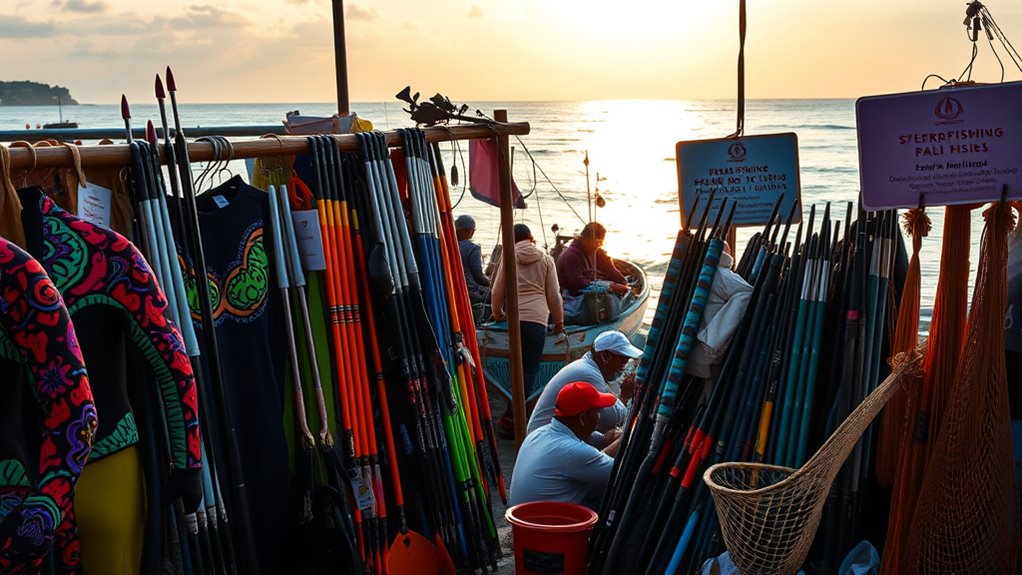
In Asia, spearfishing rules vary widely by region, with some countries requiring permits or restricting gear to protect marine life. You’ll find certain zones where protected species and reefs are off-limits, and enforcement can be strict or lenient depending on the area. Understanding these local regulations is vital to avoid penalties and support conservation efforts.
Regional Restrictions and Permits
Many Asian countries have established specific regulations and permit systems to manage spearfishing activities and protect marine ecosystems. These fishing regulations often require permits or licenses, especially in sensitive areas. In Japan, for instance, permits are needed for certain zones, and spearfishing is restricted in marine protected areas. Thailand enforces gear restrictions and species limitations to prevent overfishing. Indonesia generally allows spearfishing without a license but bans it in marine protected areas and regional zones. Okinawa permits only pole spears and prohibits spearguns and scuba gear, with strict species restrictions on protected species like corals and sea turtles. These regulations guarantee sustainable practices and help conserve marine biodiversity.
- Permits are often necessary for specific zones
- Gear restrictions aim to prevent overharvesting
- Species restrictions protect vulnerable marine life
Protected Species and Zones
Asian countries implement strict protections for certain species and zones to guarantee marine conservation. Many nations, like Japan and Thailand, prohibit spearfishing of protected species such as sea turtles, corals, juvenile eels, and specific reef fish. Marine Protected Areas (MPAs) across Asia often ban spearfishing altogether to preserve biodiversity and fragile ecosystems. In Indonesia, spearfishing in designated protected zones is illegal, with hefty penalties in places like Bali and Lombok. Okinawa restricts spearguns and scuba gear, permitting only pole spears, and specifically protects corals, turtles, and juvenile fish. Countries like Egypt and Indonesia enforce bans in sensitive habitats to support conservation efforts. These regulations aim to safeguard marine life and maintain ecological balance within Asia’s diverse marine environments.
Local Enforcement and Penalties
Enforcing spearfishing regulations across Asia relies heavily on regular patrols by local authorities, who actively monitor and penalize violations. Enforcement varies regionally, with some countries like Thailand and Indonesia conducting frequent patrols, while others face resource challenges. Penalties for illegal spearfishing can be severe, including hefty fines, equipment confiscation, or jail time, especially for targeting protected species. In Japan’s Okinawa, illegal spearfishing with scuba gear or on protected species earns strict legal action. Countries such as Egypt impose heavy penalties within protected areas like the Red Sea, often involving jail. Effective enforcement is essential to protect marine life, but limited patrols and high demand for resources challenge overall compliance.
- Regular patrols ensure compliance and catch illegal spearfishers
- Penalties serve as deterrents against targeting protected species
- Enforcement varies based on regional resources and priorities
Oceania

Have you ever wondered how Oceania balances the thrill of spearfishing with marine conservation? In this region, strict regulations focus on protecting marine environments and ensuring sustainable practices. Countries like Australia and New Zealand enforce rules on gear restrictions, seasonal limits, and minimum fish sizes to prevent overfishing. Many areas prohibit spearfishing in Marine Protected Areas to preserve coral reefs, marine biodiversity, and spawning grounds. Some island nations restrict spearfishing to specific methods like pole spears or snorkeling to reduce environmental impact. While Australia requires a recreational fishing license in certain states, New Zealand allows spearfishing without a license but enforces rules on protected species. These regulations help maintain healthy ecosystems while allowing responsible spearfishing.
Middle East

In the Middle East, regulations around spearfishing vary considerably from country to country, reflecting different priorities for marine conservation and local traditions. You’ll find Egypt strictly banning spearfishing to protect coral reefs and ecosystems. Israel permits spearfishing in designated Mediterranean zones, with restrictions on protected species like sea turtles during breeding seasons. The UAE allows spearfishing from boats or shore in specific zones, enforcing size limits and prohibiting scuba gear to conserve marine life. Many countries require licenses or permits, with penalties such as fines or equipment confiscation for illegal activity. Regional efforts focus on sustainable practices, establishing marine protected areas where spearfishing is entirely banned to preserve biodiversity. These regulations aim to balance tradition, recreation, and marine conservation in the Middle East.
- Varied regulations across nations
- Restrictions on protected species
- Marine protected areas for conservation
Frequently Asked Questions
What States Can You Spear Fish In?
You can spear fish in many U.S. states like Florida, Hawaii, California, and Texas. Each state has its own rules—Florida needs a saltwater license and has distance restrictions near swimming areas, while Hawaii allows spearfishing without a license but enforces size limits. California permits it in designated zones and seasons. Make sure to check local regulations before you dive, as rules vary widely across regions.
Can You Speargun Fish in MN?
Did you know that only a handful of states permit speargun fishing, and Minnesota is not one of them? You can’t legally speargun fish in Minnesota’s inland waters. The state’s Department of Natural Resources explicitly bans spearfishing with spearguns to protect fish populations. So, if you’re thinking about speargun fishing there, you’ll need to stick with rod and reel methods, as spearguns are illegal for fishing in Minnesota.
Do You Need a Permit to Spearfish in California?
You don’t need a special permit to spearfish in California, but you do need a valid fishing license if you’re 16 or older. Make sure to purchase your license beforehand, either online or at authorized locations. Keep in mind, certain areas and species have restrictions or seasonal closures, and spearfishing is banned in protected zones. Always check local regulations to avoid fines and ensure you’re fishing legally.
Can I Spearfish From the Beach?
Imagine the thrill of sneaking through sandy shores, spear in hand, as if you’re a secret agent on a marine mission. But, hold on! You can’t just jump in and start. You need to check if your beach allows spearfishing, stay at least 200 meters from swimmers, and avoid protected areas. Some places ban it entirely, so always verify regional rules before you channel your inner aquatic ninja.
Conclusion
No matter where you venture, understanding regional spearfishing rules keeps you safe and respectful of local ecosystems. It’s funny how a quick glance at regulations can prevent unexpected fines or missed opportunities. By staying informed, you might just find yourself sharing stories of successful dives across continents. So, next time you’re planning an underwater adventure, remember—your knowledge could be the key to *uncovering* unforgettable, responsible experiences in any corner of the world.


